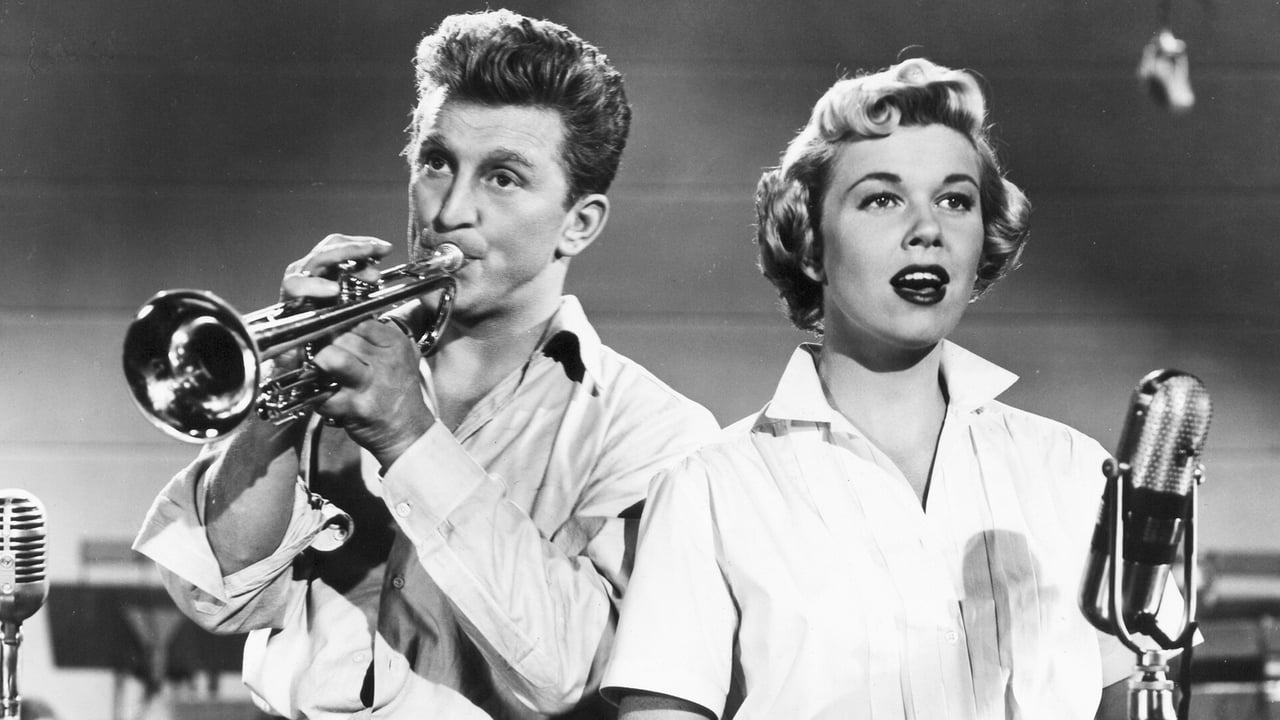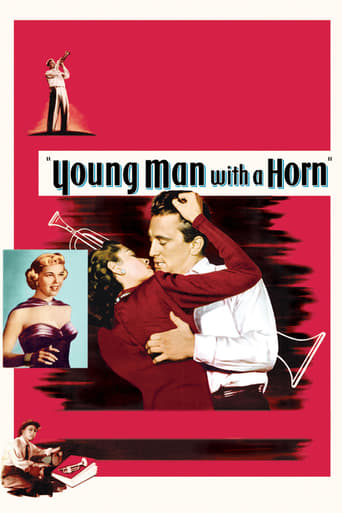ReaderKenka
Let's be realistic.
GarnettTeenage
The film was still a fun one that will make you laugh and have you leaving the theater feeling like you just stole something valuable and got away with it.
Sameer Callahan
It really made me laugh, but for some moments I was tearing up because I could relate so much.
Kinley
This movie feels like it was made purely to piss off people who want good shows
TheLittleSongbird
With such blazing source material, a great director like Michael Curtiz (whose 'Casablanca' and 'The Adventures of Robin Hood' are two of my favourite films) and talent like Kirk Douglas, Lauren Bacall and Doris Day, as well as being based on an interesting man and life, 'Young Man with a Horn' had so much going for it.On the most part too, 'Young Man with a Horn' lives up to its vast potential. The only glaring fault is the ending, which felt rushed, far too syrupy and tacked on, considering the sordid and sleazy nature of the rest of the film it really jarred and quite badly. Some may be disappointed at the biographical sections being fictional (then again biopics are rarely accurate) and that the tone of the source material is softened.'Young Man with a Horn' does more right than it does wrong. It looks wonderful, with a stylish visual look with inspired film noir-ish touches. Curtiz allows atmosphere and emotional power to come through, and come through they do. The music is one of 'Young Man with a Horn's' best assets, being a singer and cellist this component has always been important to me and is always mentioned in my reviews. Not just the superb playing of Harry James, but some great songs sung by Doris Day that are also beautifully staged. "The Very Thought of You", "Too Marvellous for Words", "I May be Wrong" and "With a Song in my Heart", all terrific, as are the arrangements of "The Man I Love" and "Get Happy".The film is intelligently scripted without getting over-heated and never feels bland. The story is absorbing and enough of the sordid and sleazy nature comes through as well as the emotional power.Kirk Douglas is outstanding in the lead role, particularly in the tormented scenes. Lauren Bacall also excels as does a cast against type Doris Day. Hoagy Carmichael is smooth and warm-hearted and Juano Hernandez gives his role great dignity.All in all, very powerful even when softened in comparison to what it's based on. 8/10 Bethany Cox
James Hitchcock
I have never been able to discover why the title was changed from "Young Man with a Horn" to "Young Man of Music" when this film was shown in Britain. Did the British Board of Film Censors take exception to that rather obvious double-entendre in the original title, something which unaccountably escaped the notice of their American counterparts? Or was the change made in the interests of musical accuracy? The hero, after all, does not actually play the horn, at least not in the sense in which Classical musicians would understand the term. I know that jazz trumpeters (and also saxophonists) sometimes refer to their instruments as "horns", but this is primarily an American usage which might have confused British audiences. (In Australia it became "Young Man with a Trumpet").The film follows the rise, fall and rise again of a jazz trumpeter named Rick Martin. Besides Martin himself, it also focuses on four people who play important roles in his life. These are Art Hazzard, the man who teaches Rick how to play the trumpet, his close friend the piano player Smoke Willoughby, Jo Jordan, a singer who falls in love with him, and his wife Amy. (It has been suggested that Rick was based upon Bix Beiderbecke).Unusually for a film from the early 1950s when Hollywood still operated an unofficial colour-bar and black actors were mostly confined to minor roles, often as domestic servants, this one features a major black character in the shape of Art. Art, himself an outstanding jazzman, is not just Rick's teacher and mentor but also, in a sense, his adoptive father. (Rick is an orphan who never knew his biological father and whose mother died when he was a child). The name "Art" may be short for "Arthur", but I wonder if its use here was meant to imply Art's "artistic" nature. A theme of the film is the schism between two very different forms of jazz. There is the predominantly white music of the big bands and dance orchestras. This is a "conservative" style in that the musicians need to keep to a strict rhythm that people can dance to and play exactly what is written in the score. And then there is the traditional jazz favoured mostly by black musicians, much "freer" than the big band sound, both in the sense that the rhythm is less strict and in the sense that it allows the musicians more scope for improvisation and experimentation. Although Rick is white, the influence of Art means that he is instinctively drawn to this "black" music, but he nevertheless has to earn his living playing in an orchestra. (There is no money to be made from trad jazz). The differences between these two forms of music are reflected in the differences between the two women in Rick's life, although the parallels are not always exact. Jo, a sweetly innocent girl-next-door type who shares Rick's passion for jazz, can be seen as the safe, predictable conservative option. The beautiful, sophisticated Amy, who is studying to become a psychiatrist, seems to Rick to be more of a free spirit, spontaneous, unpredictable and dangerous, even though she has little interest in music. Despite their widely differing personalities, the two women are initially friends, although their friendship does not survive their rivalry over Rick. Paradoxically, Amy both looks down on Jo and envies her. She says of her "It must be wonderful to wake up in the morning and know just which door you're going to walk through. She's so terribly normal."It is precisely because Amy is not "terribly normal" that Rick marries her- and it is for the same reason that their marriage proves a failure. Even a free spirit like Rick needs some order and stability in his life, and a woman like Amy, who has deep psychological issues due to the suicide of her mother, is precisely the wrong person to provide it. (It is also suggested that Amy may have lesbian tendencies, although the Production Code meant that this suggestion had to be very veiled. So veiled, in fact, that Lauren Bacall never realised she was supposed to be playing a lesbian). The failure of his marriage sets Rick on a downward spiral in which he abandons his career and descends into alcoholism.There are a number of excellent acting performances, including Juano Hernández as Art and Hoagy Carmichael as Smoke. (Carmichael was best- known as a musician, but he made a number of acting appearances, generally playing a musician). I have not always been the greatest fan of Doris Day, but here she is excellent as the naive but wholesome Jo, as is Bacall as the husky-voiced sophisticate Amy. Both seem absolutely made for their roles to the extent that I could not imagine any other actress playing them. I could certainly not, for example, envisage Bacall as Jo or (even less) Day as Amy. And then of course there is Kirk Douglas as Rick; this may not be his most celebrated performance, but it is certainly one of his best, seeming to prefigure another film, "Lust for Life" about Van Gogh, in which he played a conflict-ridden artist.Other excellent features include the jazz score- the trumpeter Harry James actually performed the music Douglas is shown playing- and Michael Curtiz's striking photography of the New York urban scene; I wondered if this was an influence on Woody Allen's "Manhattan". The one weakness was the ending; the story of Rick's rise and fall is told in detail, but the story of his rise again in which he kicks his drink habit and rediscovers his love of both Jo and jazz seemed very rushed, something tacked on to provide the expected happy ending. Overall, however, this is the best film I know about jazz music. 9/10
qormi
On the whole, an excellent film. Kirk Douglas is a great leading man - he can read the phone book for an hour and go through a range of emotions. Doris Day played her role very well - a flawless performance. Lauren Bacall was perfect as the screwed up man eater. Hoagy Charmichael served as the narrator, bridging the stages of the story while playing Rick's best friend. The direction, the sets - Bacall's lavish apartment, the hotel bar, the African American church, the nightclubs.....all were unforgettable. The movie moved steadily along and got you involved. Douglas looked like he was actually playing he trumpet.It was so refreshing to see a black actor in a major role - as Rick's mentor. Also, the many black actors in the band and in the church - there were absolutely no stereotypes, as blacks were often depicted in a negative light at this time. The scene where it is revealed that Bacall's character is bisexual was very daring in 1950.The film could have been much better, however. The ending was rushed - more time should have been spent showing Rick's descent into alcoholism - instead, it was like he woke up one day and was a washed up alcoholic wandering the streets. Douglas should have been given the opportunity to depict all the heartache of gradually slipping into the hell he was in. He did a very good job, however, with what time he had - like I said, it was rushed. The ending was resolved as if by magic - it actually tarnished the entire film.
inhonoredglory
A very, very interesting movie – such complex and compelling characters! It's not a plot-driven film, which makes it so large in scope and realistic, actually, as we follow Rick Martin from childhood to adult life. The symbolism is quite profound and the theme, very worthwhile. Amy's (Lauren Bacall) inability to play the piano boldly reflects her inability to find a purpose in life. Rick's (Kirk Douglas) struggle to reach the high note on his trumpet reflects the impossibility of finding life's purpose in musical talent alone. Jo's (Doris Day) simplicity exemplifies the honest, selfless, caring goodness we should all strive for to be truly happy. Art Hazzard's (Juano Hernandez) words to Rick are also quite didactic when you think about it. A quite inspiring film, I'd say, that wonderfully moves above the genre/cliché summaries it is given on the DVD cover! And the music, of course, was top-notch. I loved hearing Harry James do his magic! And Doris Day, of course. What a musical feast! The acting, especially by Kirk Douglas, was very good. I actually came into this not caring much for watching Douglas, but in the end, he came off as a very likable guy, the occasional boyish innocence confused by a world that does not make sense.

